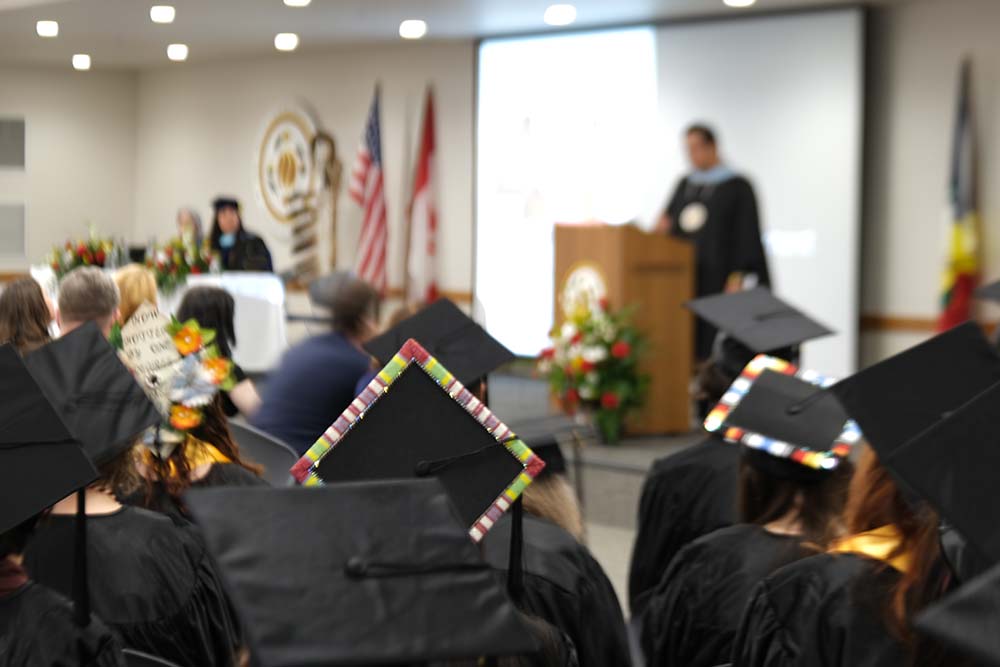
- Details
- By Bay Mills Community College
Located in the heart of Anishinaabeg homelands in Michigan’s Upper Peninsula and founded by the Bay Mills Indian Community, BMCC is more than just a college, it’s a place where Native identity, community values, and accessible education come together.
And here’s what might just be the deciding factor: BMCC offers tuition-free education to all federally recognized tribal members and their first-generation descendants. Yes—free. Not a grant you might have to pay back, not a temporary program. Just real, sustained access to higher education without the burden of tuition.
Most programs are available entirely online, so whether you’re raising a family, working full-time, or living in a different state, you can log in and learn on your schedule. That flexibility is key for so many students who are juggling more than just school.
BMCC offers degrees and certificates in programs like Business Administration, Computer Information Systems, Early Childhood Education, Anishinaabemowin Language Instruction, and more; courses that not only build careers, but build community capacity too.
“Prospective students are encouraged to select BMCC for a superior education that is deeply rooted in culture, traditions, and values,” said Duane Bedell, President of Bay Mills Community College. “Our dedicated and highly qualified faculty and staff are committed to expertly guiding you through your academic journey, providing personalized attention and understanding your unique needs.”
And here’s something else that sets BMCC apart: it was the first accredited Tribal College in Michigan, and it’s a proud land-grant institution. That means it was built for, and by, Native people with the goal of advancing tribal sovereignty, language, and knowledge.
“Bay Mills Community College represents the best of who we are as Anishinaabe people; resilient, rooted in culture, and committed to lifting up future generations,” said Whitney Gravelle, President of the Bay Mills Indian Community and President of the BMCC Board of Regents. “I encourage all students to learn more about BMCC, as we remain committed to offering all students a pathway to empowerment, self-determination, and a brighter future grounded in sovereignty and identity.”
Courses include culturally grounded content, small class sizes, and instructors who understand what it means to be Native in higher ed. You won’t be lost in a sea of lecture halls. You’ll be seen, supported, and encouraged.
Bay Mills Community College might not be on every list, but maybe it should be on yours.
Want to learn more or apply? Visit www.bmcc.edu or call (906) 248-3354.
You don’t have to leave your culture behind to earn a degree. In fact, at BMCC, it’s your biggest strength.
Chelsey Cameron
Media & Marketing Specialist
Bay Mills Community College
[email protected]
Help us defend tribal sovereignty.
At Native News Online, our mission is rooted in telling the stories that strengthen sovereignty and uplift Indigenous voices — not just at year’s end, but every single day.
Because of your generosity last year, we were able to keep our reporters on the ground in tribal communities, at national gatherings and in the halls of Congress — covering the issues that matter most to Indian Country: sovereignty, culture, education, health and economic opportunity.
That support sustained us through a tough year in 2025. Now, as we look to the year ahead, we need your help right now to ensure warrior journalism remains strong — reporting that defends tribal sovereignty, amplifies Native truth, and holds power accountable.
 The stakes couldn't be higher. Your support keeps Native voices heard, Native stories told and Native sovereignty defended.
The stakes couldn't be higher. Your support keeps Native voices heard, Native stories told and Native sovereignty defended.
Stand with Warrior Journalism today.
Levi Rickert (Potawatomi), Editor & Publisher
